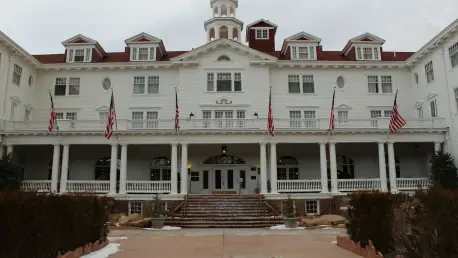The Stanley Hotel in Estes Park, Colorado, renowned for its historical significance and cinematic allure, is poised to undergo a monumental transformation with a $300 million renovation funded through the municipal bond market. The project’s primary aim is to enhance the hotel’s stature within the film industry while simultaneously boosting regional tourism. This significant renovation is a result of over a decade of meticulous planning and collaboration among the hotel’s owners, state authorities, and cultural entities. The revitalization efforts are also strategically aligned with the upcoming relocation of the Sundance Film Festival from Utah to Boulder in two years.
Situated on more than 40 acres, the Stanley Hotel, which dates back to 1909 and is listed on the National Register of Historic Places, stands as the sole full-service hotel at the entrance of Rocky Mountain National Park. Its existing features, including 196 rooms, outdoor pools, a spa, several restaurants, and a concert hall, have long attracted visitors. The planned expansions, however, promise to significantly elevate the hotel’s offerings, adding 65 new guest rooms, a modern lobby and arrivals area, and a state-of-the-art event center. These enhancements are projected to not only boost the hotel’s capacity but also improve its appeal to both leisure and business travelers.
Extensive Facilities and New Attractions
Expansion of Guest Accommodations
One of the core components of the Stanley Hotel’s renovation involves the addition of 65 guest rooms, bringing the total to over 260 rooms. This expansion is expected to accommodate a growing number of visitors drawn by the hotel’s historical charm and its proximity to the Rocky Mountain National Park. The new rooms will be designed with modern amenities while retaining the classic elegance that the Stanley Hotel is known for. Additionally, the new lobby and arrivals area aim to provide a seamless and welcoming experience for guests, enhancing their overall stay.
The event center is another critical part of the renovation, designed to cater to a variety of events ranging from corporate gatherings to social celebrations. The state-of-the-art facilities will feature advanced audio-visual technology and versatile spaces, making it an attractive venue for conferences, weddings, and other significant events. These upgrades are anticipated to attract a broader demographic, including business travelers and event planners, thus expanding the hotel’s market reach and boosting its revenue potential.
New Cultural and Recreational Offerings
A highlight of the renovation is the creation of a new cultural center, aimed at solidifying the Stanley Hotel’s position as a hub for the horror film industry. This new facility will house a museum, film archive, horror movie sets, and a collection of artifacts. An auditorium with a capacity of 1,100 people and a 176-seat theater will further support the hotel’s cultural initiatives. Blumhouse Productions, a prominent name in the horror genre, will curate and host various events at the venue, ensuring a constant stream of attractions for film enthusiasts.
The new speakeasy will add a unique and intimate dimension to the hotel’s offerings, providing guests with a distinctive entertainment option. This eclectic mix of cultural and recreational facilities is designed to attract diverse visitors, from film buffs to vacationing families, thereby broadening the hotel’s appeal. The facility will also maintain its tradition of hosting the annual Sundance Directors Lab program, which commenced at the Stanley Hotel last year, ensuring ongoing engagement with the film community.
Financing and Economic Implications
Municipal Bond Market and Risks
The $300 million renovation project will be financed through the issuance of municipal bonds, managed by a state authority. These tax-exempt bonds will be primarily backed by the hotel’s revenue streams, presenting unique opportunities and challenges. Given that the bonds are unrated, the investment carries a higher degree of risk, being accessible only to qualified investors. Potential risks noted in the bond documents include tariffs on imported construction materials, which could increase costs and affect project completion.
Mark Heller, the executive director of the Colorado Educational and Cultural Facilities Authority, oversees the bond issuance. Upon the completion of the renovation, the Stanley Hotel is expected to become a wholly owned subsidiary of the public entity that finances cultural and educational institutions in the state. This collaborative financial framework underscores the project’s significance, aligning the interests of the hotel, state authorities, and the broader community to achieve shared economic and cultural goals.
Broader Economic Impact
The renovation’s anticipated economic impact extends beyond the Stanley Hotel itself, promising substantial benefits for the broader region. The enhancement of the hotel’s facilities is expected to create numerous job opportunities, both during the construction phase and in the long term. The influx of visitors attracted by the expanded amenities and cultural offerings will likely stimulate the local economy, benefiting businesses in Estes Park and beyond.
Moreover, the hotel’s enhanced reputation as a cultural and touristic hub is likely to draw attention from national and international travelers. The relocation of the Sundance Film Festival to Boulder is poised to further amplify this effect, positioning the Stanley Hotel as a pivotal player in Colorado’s tourism landscape. This extensive renovation, therefore, represents a significant investment not just in the hotel’s future, but in the regional economy as a whole.
A Bright Future for the Stanley Hotel
The Stanley Hotel in Estes Park, Colorado, famous for its historical importance and cinematic charm, is set for a grand $300 million renovation. This overhaul will be funded via the municipal bond market and aims to strengthen the hotel’s role in the film industry while boosting local tourism. This significant update follows more than a decade of careful planning and teamwork between the hotel’s owners, state authorities, and cultural organizations. The improvements are timed with the upcoming relocation of the Sundance Film Festival from Utah to Boulder in two years.
Covering over 40 acres, the Stanley Hotel was established in 1909 and is listed on the National Register of Historic Places. It remains the only full-service hotel at the entrance of Rocky Mountain National Park. The hotel already features 196 rooms, outdoor pools, a spa, several restaurants, and a concert hall. The planned renovations will add 65 new guest rooms, a modernized lobby and arrivals area, and a state-of-the-art event center. These enhancements aim to elevate the hotel’s allure and increase its capacity, appealing to both leisure and business travelers.









